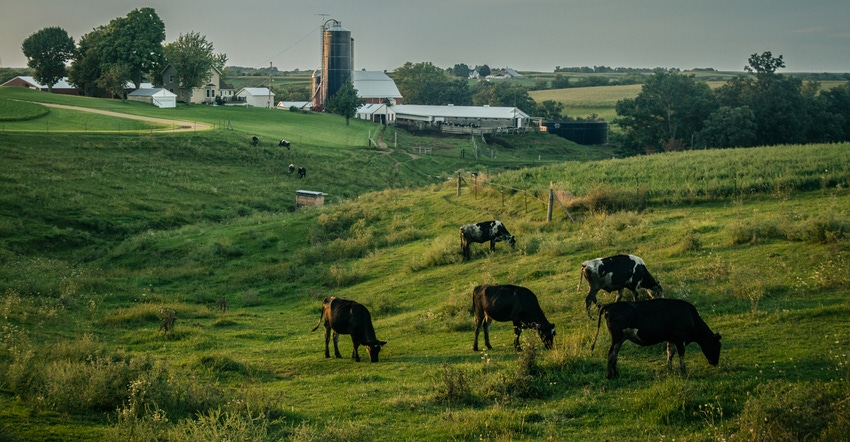
Danone is meeting with New England and New York organic dairy leaders sometime this week as the effort to save 89 dairy farms from losing their contracts heats up.
Ed Maltby, executive director of the Northeast Organic Dairy Producers Alliance, confirmed that a virtual meeting would take place between the company and organic dairy leaders, but he did not go into detail on what would be discussed.
The meeting will take place months after Danone, which owns the Horizon Organic label, announced that it was dropping 89 producers in New England and eastern New York state, citing growing transportation and operational challenges.
Heat is on
State ag leaders across the region have started discussions on how to help save the affected farms. And just last week, a group of 11 regional organic farming and consumer groups submitted a complaint to B Lab, which sets the standard for national B Corporations, asking it to investigate Danone for breaching the B Corp.’s community core values.
“Danone N.A.’s decision to abruptly sever contracts with an entire U.S. region affecting 89 family farms was one based solely on maximizing profits, regardless of the devastating consequences for their suppliers’ families and rural communities,” the complaint says. “This action ignores the decades of corporate profits gained from the work of these independent dairy farms and the social reputational benefits they helped the company earn from consumers. This abrupt action directly violates a commitment to conducting their business as if people and place mattered. It also violates Danone N.A.’s corporate declaration to aspire to do no harm and benefit all through their products, practices and profits.”
Stripping Danone of its B Corp. status would be potentially damaging to the company’s reputation. But the U.S. Chamber of Commerce notes that B Corporations don’t enjoy special tax benefits under the U.S. tax code.
What is a B Corp.?
According to the U.S. Chamber of Commerce, a B Corp. is a for-profit corporation that is driven by both mission and profit. Shareholders hold the company accountable to produce a financial profit, as well as some sort of public benefit.
Companies that are registered as a B Corp. must achieve a minimum score on the B Impact Assessment. This assessment is an evaluation of the company’s effect on its workers, customers, community and environment.
The organic farming groups have also activated a live petition submitting signatures every two weeks to B Lab.
Complicated history
Horizon Organic and Danone have a complicated history in New England. Horizon, operating as an independent company, bought The Organic Cow brand from the H.P. Hood Co. of Massachusetts in 1999. The Organic Cow, according to Food Ingredients Online, was the first major organic dairy in New England selling milk, ice cream, cottage cheese, sour cream and butter.
Horizon was bought by Dean Foods in 2004 and became part of the spun-off WhiteWave in the mid-2010s.
Danone, meanwhile, came onto the New England scene when it bought New Hampshire’s Stonyfield Organic in 2001, but then sold off Stonyfield when it decided that it wanted to buy the much larger WhiteWave in 2017.
Since then, Lactalis, the second-largest dairy company in the world, bought Stonyfield, and Danone continues to own Horizon. Another complication, Maltby says, is that Organic Valley/CROPP Cooperative provides 80% of the fluid milk Stonyfield uses for its yogurt. The rest comes from limited direct contracts Stonyfield has with producers.
Stonyfield announced in October that it was looking to bring on some Horizon dairies, but nothing has been set in stone. It remains to be seen if Stonyfield will come through on its promise. So, in essence, the Organic Valley/CROPP Cooperative would be the only option for organic dairy farmers looking for a buyer unless something changes between now and August.
Lack of dairy infrastructure
Ultimately, Maltby says the long-term goal is to secure a long-term organic fluid contract with an existing plant, or to build a new organic milk plant likely in the capital region of New York state.
Most of the existing plants that do organic, he says, are already at capacity and are not accepting more fluid milk.
A new state-of-the-art plant, he says, would cost about $50 million to build and would likely have to be built in the capital region of New York state to make it feasible for long truck runs into more remote areas of Vermont, New Hampshire and Maine.
Another issue is balancing, Maltby says. If there is surplus organic fluid milk on the market at one time, the plant would have to be self-sufficient enough to take that surplus milk and sell it for shredded cheese, powder or some other product — because once it’s sold into the conventional market, the price plummets, even lower than Class IV prices at times, he says.
About the Author(s)
You May Also Like






